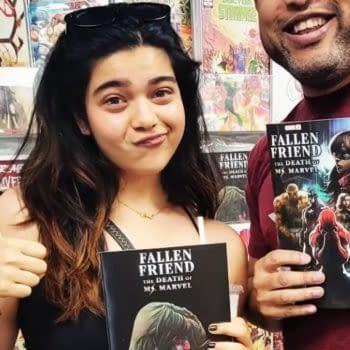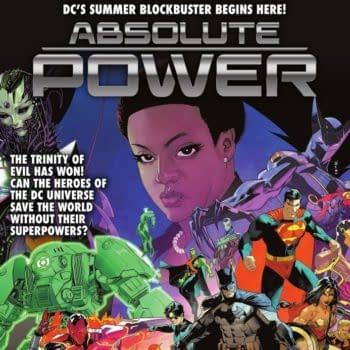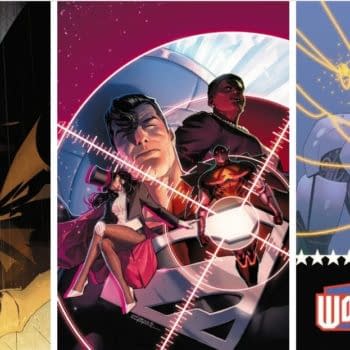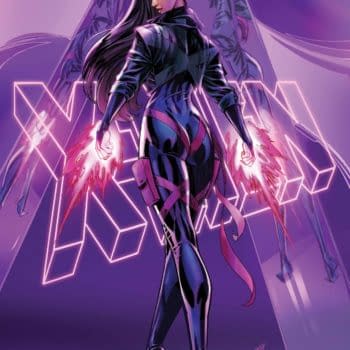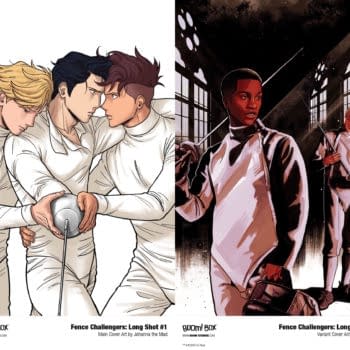Posted in: Short 'n Curlies by Si Spurrier | Tagged: Alan Moore, short and curlies, si spurrier
Short 'n Curlies #31 by Si Spurrier
The Keyboard Is My FuckMonkey:
Okay. A few final squeezings from the citric tumour I've been mercilessly wringing-out this past couple of weeks, concerning the whole Western-World Superhero / comic-book / industryrape / storydeath Thing. My ramblespleen has been infected with obsession, and I must Splurge For Closure.
See, it's occurred to me that all the negative connotations and cynicisms which I associate with Costumed Adventurers — hahaha, sorry, sorry, but c'mon, what a name — don't actually have anything to do with the nature of the subgenre itself. The punching, the capes, the masks, the crotchbulges: they're not the problem. I mean, shit: I like a bit of fetishistic roleplay m'self, and the simple truth is that dressing-up your Mythic Moral Parables with bright colours, badscience magic powers and planetary-scale titties does not an Evil Concept make.
In fact, all those nebulous Black Marks Upon The Comic Medium, which I've been gamely brainmaking here recently (to whit: the damage being done to the direct market, the dearth of envelope-pushing material, the culture of formulaic narrative-patterns, the moribund creativity, the simplistic morality, and above-all the spiralling crashing dwindling Lack Of Appeal to a wider non-media-savvy audience) have precisely fuck all to do with the subgenre's Core Concept: that Boyscout Characters Think You Can't Dispense Justice Unless You Don A Gimpsuit. That's just a thing. An arbitrary, wacky, but essentially unimportant Thing — no better, worse, or more crazy than any other contrivance at the heart of a well-known story-type. To blame it for the ongoing creative woes of the Western Comics Industry is… well… Bollocks.
No. What it really comes down to — shock, gasp, *gag* — is history, money, and Publishers Not Being Stupid.
Roleplay. You've a hankering to establish — and who hasn't? — a proto-empire of Sequential Narrative Entertainment. You pump out a bunch of anthologies, oneshot titles, amazing arty explorations of progressive cultural brilliance and a couple of floppies packed with fart gags and Purple Veined Dick Jokes. Being, as you are, Not A Remtard, you quickly discover that what your bank manager wants you to focus-on, Above All Things, is not producing individual artefacts of glittering anthropological value, is not orchestrating glorious nuggets of unrelated High Art, is not even overseeing an occasional flash-in-the-pan oneshot which sells like gangbusters and earns more than a Leprechaun's Lottery. No, what he wants is continuity. He wants you earning a decent amount week-in, week-out, without fail. He wants your audience ordering in advance: so hooked on the product, on the culture, on the ongoing Big Picture Life Enhancement, that it'll cough-up it's $X.99 irrespective of quality, marketing drives, fluctuations in creative merit and inconvenient outbreaks of Faddish Irony.
Listen to this very closely. It's important:
If you try to tell a Comic Book Publisher that a Good Story constitutes a Beginning, a Middle, and an End, he'll nod, frown, smack his lips, and tell you he definitely agrees with the first two parts.
With me?
I mean, really, it could've been anything. It nearly was anything. War stories, pirates, dinosaurs, fantasy, horror, Vikings, space pirates, cowboys, space dinosaurs, ancient myths, medieval romance, space Vikings with Cowboys on Dinosaurs, outlaws, cops, bounty hunters, space cop myths, biorhythmic conceptual Astral Saboteurs In Space, or Chicks With Enormous Knockers…
For whatever reason, back in the day — and I'm talking specifically about America, here — Superhero Comics Were The Comics Which Did Well. If you ask Scott McCloud it had a lot to do with primitive colour-printing processes, primary inks, and the pragmatic decision to have one's morally-upright protagonist wear an outrageously garish outfit (and then finding a plausible reason for him having done so). Personally, I'd argue it's also got a lot to do with the peculiarities of the American Culture of the day (a mimetic bundle of idealistic morality, lack-of-subtlety, boomtime ebullience and thick slabs of Cheesecake), because the rest of the Western World seemed to manage just fine without embracing the Superhero as its Comicbook Figurehead of choice. The UK, instead, dallied for a long time over cherished tropes of chirpy sci-fi and square-jawed sporting Fairplay, then pioneered grim parables of ultraviolence and villainy and wanked-away the 60's and 70's in a haze of war comics, mean-spirited action, and punk-rock sci-fi insanity — all the while pumping out its kiddy-aimed fare of Mischief, Bullies, and boarding school buggery.
Continental Europe, by distinction, got a raging stiffy for morally-ambiguous espionage, hi-concept space adventures, painstakingly-researched historical epics, and Slab-Thighed Barbarian Princesses being ravished by sword-wielding fantasy warriors whose muscles are matched in number only by the syllables of their names.
I'm generalising. Stay with me here.
But the US got hung-up on spandex. Fine. Whatever.
Frankly the whys and wherefores don't matter a jot. People Fighting Crime In Bright Outfits is no sillier than any other speculative quasi-genre out there: it just happened to be the one, in the US at least, that had enough early successes, enough strokes of luck, enough creative ingenuity — and enough stamina — to tangle itself up in the utterly simplistic and thoroughly predictable market forces around it.
And to dominate them.
Superheroes have infected the market. They have eclipsed all else. They've become ubiquitous: the norm, the substrate, the standard. And because of our chum the bank manager — with his simple desire for a continuous, non-fluctuating money-stream — and because of our chum the publisher — who firmly believes that a good story begins and then goes on forever — a few simple truths have come to characterise the Superhero Genre:
1. Stories exist in a shared universe. Like fashion labels hoodwinking their consumers into voluntarily advertising the brand, a Fictional Internal Continuum allows every single title a publisher presents to advertise every other. Nothing shatters human defences like the Completist Instinct, and the big publishers have crossed-over, Summer-evented, sideways-promoted, tied-in and spun-off with an abandon as merciless as it is creative. Like amoebic predators — reaching out with protoplasmic tendrils made of pure entertainment — the publishing world's Shared Universes have slurped together, fought, exchanged genetic material, and ultimately Absorbed The Living Fuck Out Of Each Other, at every opportunity.
2. The Character Is King. Publishers understand that everything within their sphere of influence — creative teams, cultural trends, media forms, economic considerations — are transient, unreliable and utterly temporary. Everything, that is, except for the Intellectual Properties they hold close to their bosom. Those difficult-to-define kernels of fictional data, bundled into facsimiles of people, places and events. THOSE are the standard units of Gratification the publisher offers, and with a finely-developed sense of acumen they have made it their business to centralise the importance of those tropes.
Stories are for once. Characters are forever.
Which is why–
3. Nothing Ever Ends. Writers and artists will insist, those nomadic fuckers, on coming and going. And audiences will insist, the poor deluded fools, on pretending the entertainment they purchase comes in the form of discrete units which they, hahaha, call Stories. But the beauty of having an arc set in a shared universe, particularly when mixed with a Character Which Is More Important Than Its Narrative, is that no story ever truly need end. This is soap-opera thinking, plain and simple, and it's the reason that so many writers become disillusioned with the idea of Big A-List Spandex Books. Wordsmiths like to feel as though it's within their powers to produce a conclusion, to end a story with a caption that reads THE END, underlined twice and emboldened in red. Then to walk away and know — to be certain — that nobody's going to be digging-up those bodies, nobody's going to be raking through the ashes, nobody's going to Re-Imagine That Awesome Origin Story, except this time with — ha ha ha — a comedy sidekick and a Communist Love Interest.
Because that's just not gonna happen with the Big Spandex Titles. For every scintillating "End Of An Era" climax, for every SuperHot Creative Team Finishing Its Run, there's another arc round the corner, another team ready to hustle-in. Even when a book is cancelled, or euphemistically called a Mini-Series, or otherwise given the illusory aspect of finality — an end! a sunset moment! — then still the character who got his happy ending, or got the girl, or got his comeuppance, or bloody died, will be back in a month or three as a guest-star in another title. And the whole machinery grinds onwards.
And that's no biggie, really… Except that a continuum, by its nature, requires every part of its content to influence every other. Go watch Tremors 2 and Tremors 3, then try and watch the awesome unsurpassable original without feeling it's been somehow diminished by the knowledge that, within this continuum, that crazy gun-toting survivalist character is going to end up taking potshots at badly-animated crap-looking Flying Versions of the burrowing graboid gribblies which, I'm not making this up, fart fireballs.
This is why I never read another Swamp Thing comic after Alan Moore's run. In the universe I'd like to imagine, there are no others. The publishers, naturally, don't see it like that.
Anyway, enough of this guff. There are two points to take away from all this.
The first is that those 3 Simple Truths are not specific to Superheroes. If fate had spasmed, shat a kidney, and diverted the comic-reading massmind of the USA into an obsession with, say, Basketball Comics, then you can bet that all the books put out by any given publisher would still take place in a shared universe, that all the characters would still cross-over, spin-off and bench-sit in each other's games, and that you'd still have popular players starring in stories 80 years after they were first created. And probably coming back from the dead to star in That One Big Game.
The second point is that even though it's easy to blame those 3 Simple Truths for aaaaaall the things I've been whingeing about in the past two weeks — the industry's reliance on an increasingly obsessive yet dwindling readership, the perceived synonymy between the dominant genre and the medium itself, the endlessly repeated story clichés, the lack of any genuine drama (as a result of the foreknowledge that the status-quo Never Truly Changes), and so on — there's really no other way that publishers could've played it. They've acted according to simple and clear-cut market philosphies, and would've been fucking stupid not to. Superheroes, like them or not, have (in their day) been Astonishingly Successful. And, like it or not, a lot of Superhero stuff they're producing at the moment continues, against all the odds, to be fucking great.
It's just a question, now, of how the publishers — how the whole industry, really — can save themselves from becoming victims of their own success: nicheing themselves out of reality. And, more importantly, a question of how the dominant Superhero Continuities handle the digital-medium Paradigm Shifts which, we're endlessly told, are coming down the pipeline.
For instance: Does the soap-opera approach become irrelevant in a world without Print, without Advance Orders, and without an emphasis on sales predictability? Or does it become even more entrenched, as the "tune-in-and-get-a-hit" mentality erodes the idea of stories having — or needing — endings, even more than is already the case?
One to ponder, there.
Next week, lots of Hate and Randomness: I promise.
Find Me @:
Twitter: @SiSpurrier
WWWebbage: www.simonspurrier.blogspot.com
Send wurdz, thoughts, stories, Hatings, and Spiny Gibbons From Neptune to the Only Checked Occasionally And I Might Not Bother Replying At All Ha Ha Ha email address:
Contact@Chop-This-Bit-Outsimonspurrier.co.uk
Or the It Might Not Get To Me At All But If It Does I Promise To Recycle It snailmail address:
C/O William Christensen,
Avatar Press
515 N. Century Blvd.
Rantoul, IL 61866
(Disclaimer: Secretly, I'm nice.)







